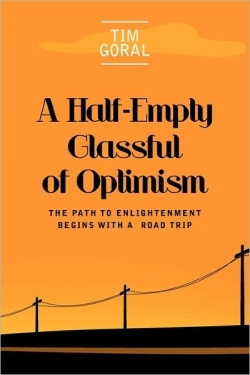A Half-Empty Glassful of Optimism
The Path to Enlightenment Begins With a Road Trip
Tim Goral should not be concerned if the self-help guru Anthony Robbins reads this novel, A Half-Empty Glassful of Optimism. Where some celebrities less secure with their positions in life might take offense, Anthony Robbins would find the novel to be exactly what the author intended—side-splitting hilarious.
Lonny Pace (Goral’s main protagonist) is the type of guy (like millions of us) who lets life happen around him. One evening while flipping channels, Lonny stumbles across an infomercial where a self-help guru, Tony Adams, seems to be speaking directly to him. Later, while listening to Adams on his wife’s Ipod, Lonny is struck by lightning. Somehow, Adams’ knowledge is transplanted into Lonny’s brain. Lonny, now loaded with all of Adams’ wise sayings, discovers a large pony-tailed man hiding in the back of his car. Lonny decides to aid this man, BB Hughes (branded as a terrorist by Reverend Jefferson Dupree, a crooked multi-media-evangelist), in his mission to bring evidence of Dupree’s criminal activities and exposing him in an Orlando, Florida newspaper. Goral writes, “Lonny looked down and saw his right hand turning the ignition key. He raised his eyebrows in wonder. His arm was moving and he was merely watching, helpless to do anything to stop it. It was as though someone else was controlling his body. Another Lonny. A Lonny Two.”
Pursued by the police and the FBI, Lonny and BB meet up with a young, free-spirited girl named Delta and her dog Boo. The three (four, including Boo) continue to flee the law, to make a wrong right as they race toward their destiny.
There is a scene in the novel that doesn’t work, and it doesn’t come off as plausible. Lonny, BB, Delta, and Boo are pulled off on the side of the road and are seemingly recognized by two FBI agents as terrorists. Throughout the novel the author makes sure that the characters who want to catch BB portray him as very dangerous and to be “shot on sight.” The two FBI agents’ approach toward Lonny, BB, and Delta is too lax on proper procedure for a situation that involves such high level threats to homeland security. They do not identify themselves as FBI agents, nor do they draw their weapons. The scene is humorous, and readers will probably laugh out loud at first, but then they will question the scene’s accuracy and the author’s failure at recognizing such an error.
Finding humor in situations that aren’t normally humorous, Goral puts a new twist on the “road-trip” trope, and adds an originality not often seen in contemporary twenty-first century novels since the likes of Kurt Vonnegut. The self-effacing and humanizing of the novel is fresh, bold, and maintains its comedy even when entering darker territory, like terrorism and religious exploitation. The author’s experience as a journalist is an apparent influence in his fiction because there are no extraneous words or forays into purple prose. His dialogue leaps off the page and pleases the ear, along with his succinct yet descriptive narrative.
Reviewed by
Lee Gooden
Disclosure: This article is not an endorsement, but a review. The publisher of this book provided free copies of the book and paid a small fee to have their book reviewed by a professional reviewer. Foreword Reviews and Clarion Reviews make no guarantee that the publisher will receive a positive review. Foreword Magazine, Inc. is disclosing this in accordance with the Federal Trade Commission’s 16 CFR, Part 255.

